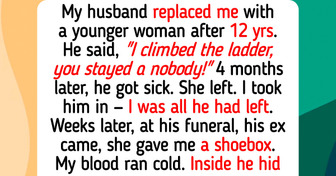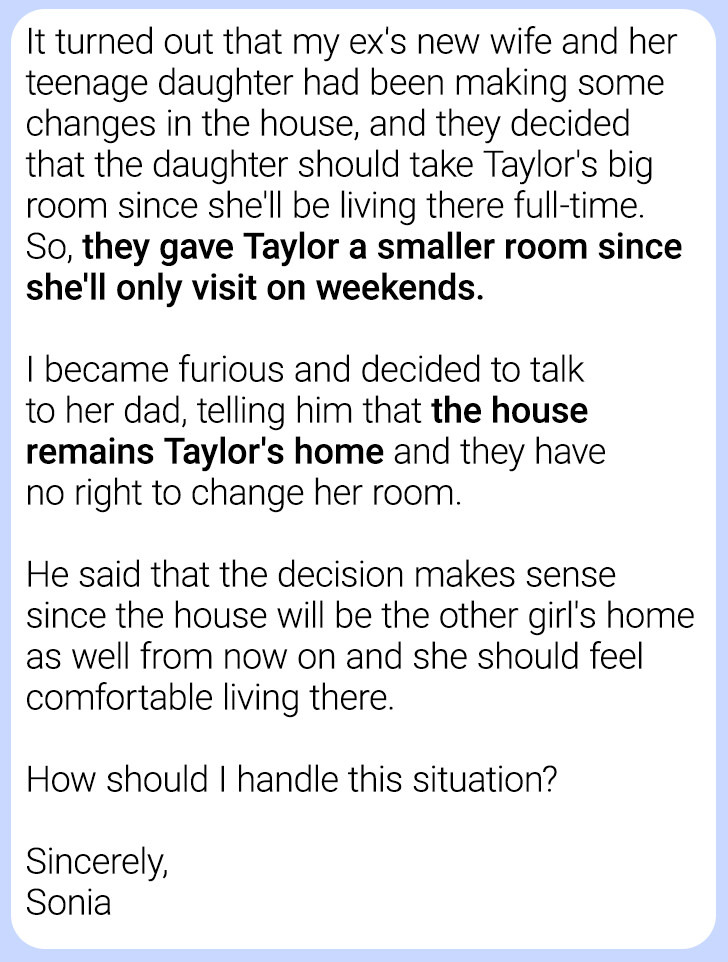Grace, your ex and his new wife COMPLETELY ignored your daughter's feelings and emotions ! You are right in your anger. Because it was her room to begin with, it should stay hers as she will be living there longer than the 15 year old. The teen will be gone in 3 years. Your ex did a great job of alienating your daughter. Therapy with all involved is warranted, at a MINIMUM for your daughter ! He has destroyed her sense of belonging and security in the only house she knows! Teen should have been given her own room in the basement however she likes it and left your daughters room alone. Signed, divorced father of 3, whose ex did her best to alienate the children
My 7 Y.O. Got Kicked Out of Her Own Room, at Her Dad’s House
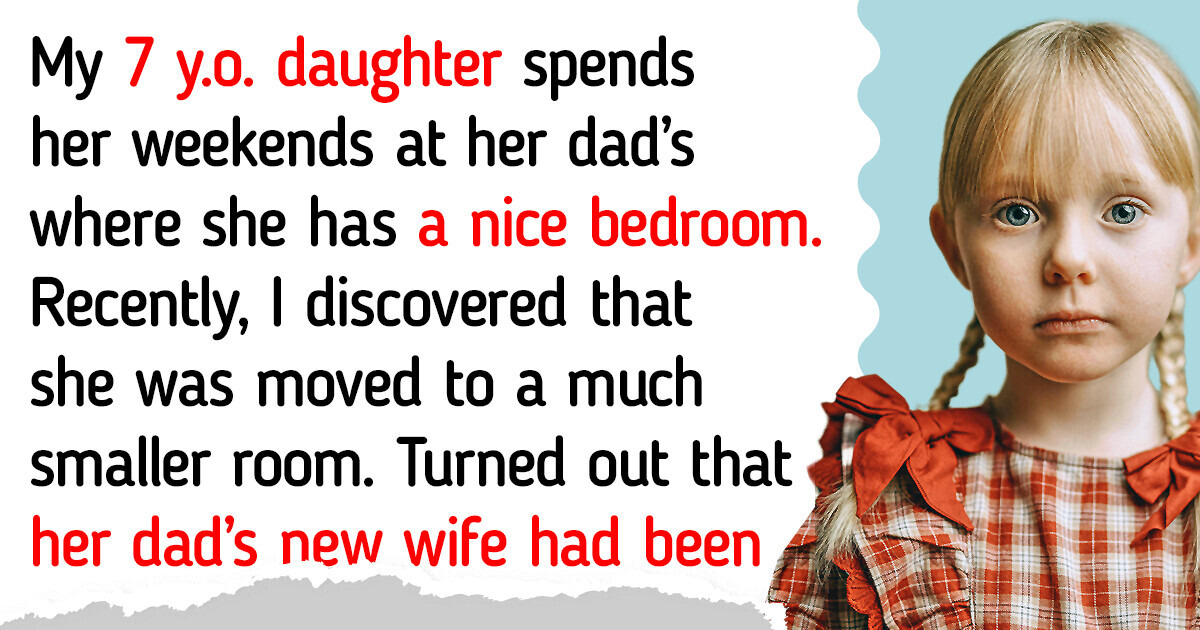
When we discover that our child is upset or has had their belongings taken away, it’s as if our world is suddenly turned upside down, and we feel compelled to do anything to shield them from harm. Sonia, a mother, found herself in such a situation when her 7-year-old daughter was relocated to another bedroom at her dad’s house. This news ignited a fury within Sonia, prompting her to reach out to us for advice.
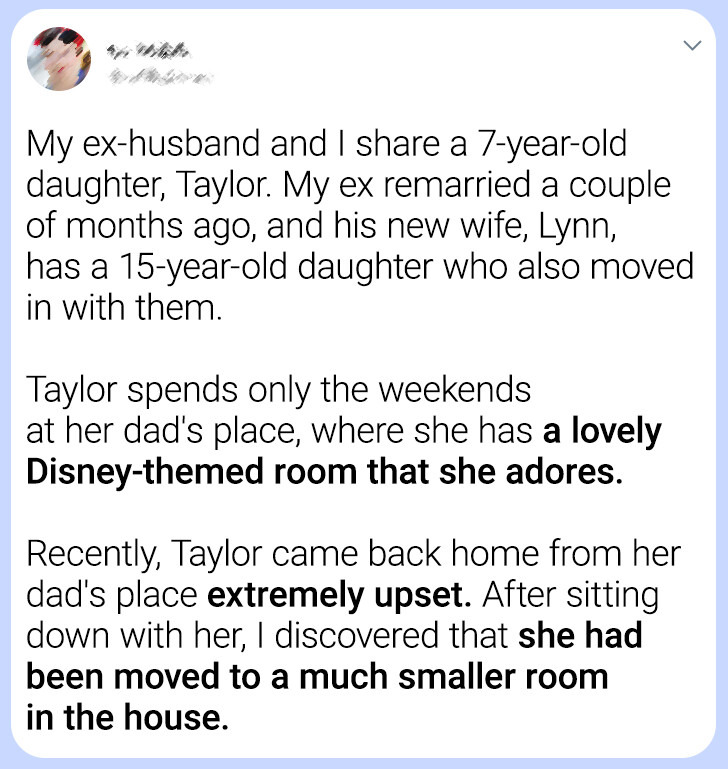
Hello Sonia! We appreciate your trust in sharing your story with us. We have compiled some tips to assist you in navigating this sensitive situation.
Consider examining alternatives.
Brainstorm alternative solutions with your ex-husband and his new wife that address their daughter’s need for a permanent living space without compromising Taylor’s sense of belonging and comfort during her weekend visits.
This could involve creative compromises such as rotating rooms on a schedule, creating shared spaces that both girls can enjoy, or finding ways to personalize Taylor’s new room to make it feel more special and welcoming to her.
Explore legal options.
Given the sensitive nature of the situation, it might be beneficial to consult with a family lawyer who can provide guidance on your legal rights and options. They can help you understand whether the recent changes in Taylor’s living arrangements violate any custody agreements or parental rights.
Legal intervention can sometimes be necessary to ensure that Taylor’s best interests are upheld and that her sense of security and stability is maintained.
Arrange family therapy.
Consider suggesting family therapy sessions for all members involved to navigate the emotional complexities of blended family dynamics. A trained therapist can facilitate discussions about boundaries, expectations, and conflicts, helping to foster understanding and empathy among family members.
Therapy sessions can also provide a safe space for Taylor to express her emotions and concerns with the support of a professional.
Encourage Taylor’s expression.
Foster an environment where Taylor feels empowered to express her emotions and concerns openly. Encourage her to communicate her feelings to her father and stepmother, emphasizing the importance of her voice in decisions that affect her living situation.
By validating Taylor’s emotions and advocating for her right to have a say in her own space, you can help reinforce her sense of agency and self-worth in navigating the complexities of her blended family dynamic.
Navigating the complexities of a blended family can often present significant challenges. Sandra, a mother, was deeply upset when she discovered that her husband had requested her daughter not to attend his birthday party because his biological daughter would be present. You can read more about her story here.
Comments
Related Reads
12 True Events That Sent Shivers Down Our Spines

I Will NOT Pay a Dime After Being Invited to an All-Inclusive Trip

I Embarrassed My Mother by Kicking Her Out of My Wedding

10+ Wedding Stories About Guests Who Crossed the Line

The Cruelest Kind of Revenge

10 Stories From People Who Regretted Eating at Someone’s House
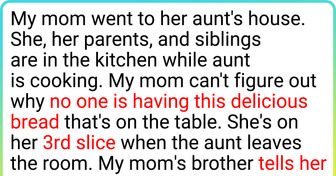
11 Fashion Tips to Achieve a Chic and Polished Look

8 Attention Tests That Only a Few People Can Get Right

15+ People Who Hit the Jackpot in a Thrift Store

13 Stories of Quiet Kindness That Show Superhuman Strength in Ordinary People

15 Stepchildren Who Finally Saw Their Stepparents as Real Family

15 Moments That Prove Quiet Kindness Is What Keeps the World Together
